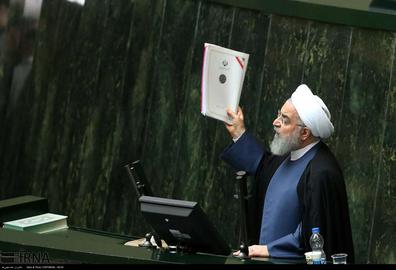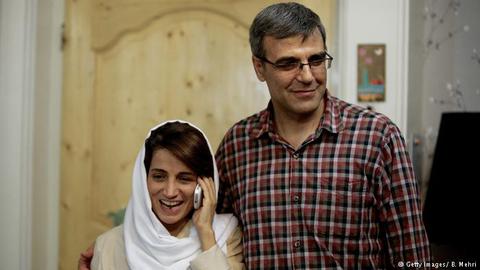When President Hassan Rouhani faced questions about his economic policies in parliament on August 28, it was also a test for the Islamic Republic’s political elite. Would it sacrifice the president for its own ambitions? Could debate about his administration’s economic performance create a consensus on the regime’s failures to usher in economic reforms?
During the session, parliamentarians asked a series of five questions, but no one —not the president, his opponents or his usual supporters — mentioned the cost of 40 years of accumulated failures, economic mismanagement and swelling corruption.
For Rouhani, the economic problems started during the administration of his predecessor, Mahmoud Ahmadinejad. At the time, Iran’s economy was suffering from the effects of United Nations’ and the United States’ sanctions. Rouhani arrived on Iran’s political stage, negotiated with international powers and the sanctions were lifted, and it appeared as though the problem was solved.
For the president’s opponents, Iran’s economic problems began when President Trump extended the United States’ sanctions relief for the last time, saying he would not do so again unless a new agreement was reached. Blaming Iran’s economic woes on “the Great Satan” and what they viewed as a gullible president who let himself be deceived by the United States was much easier than admitting the truth. Neither side will admit that Iran’s economy has reached the end of its forbearance for the mistakes they have committed.
“Prudence and Hope”
When Rouhani began campaigning as a presidential candidate, many agreed that sanctions had reduced Iran’s foreign revenues and oil exports significantly. The national currency had lost its value and Iran’s banking sector was completely isolated. Not many paid attention to the fact that corruption and public authorities’ incompetence had magnified the impact of sanctions. Candidate Rouhani portrayed himself as someone who held the key to unlock the chains restraining Iran’s economy. He would negotiate and reach an agreement with the international community to lift the sanctions. To Iranians frustrated by the populist Ahmadinejad’s ineptitude, he promised a government of “prudence and hope.”
During the campaign and the negotiations with the P5+1 countries (the United States, the United Kingdom, France, China, Russia, plus Germany), his team inflamed expectations, describing a potential deal as the solution of all of Iran’s economic problems. If Iran was supposed to gain access to its blockaded oil revenues, this would be translated into abundance. Iranians interpreted that as an increase in the supply of hard currency and in the strength of their national currency. If Iran was going to renew its aging air fleet it would be purchasing 400 brand new modern airplanes. It was as though President Rouhani was promising Iranians more and more while pitching business deals and significant profits to the other side. Thousands of Iranians were waiting for employment and looking for jobs. Private sector entrepreneurs needed investment and markets for their products. Everyone was told to wait for the nuclear deal and the lifting of the sanctions.
No Crackdown on Corruption, No Change
In reality, Iran’s economy did not, and still doesn’t, offer a safe business environment to anyone. The long shadows of military organizations such as the Islamic Revolutionary Guards Corps (IRGC) did not make investors or entrepreneurs safe. Corruption cases and financial crimes remained widespread. Corrupt officials and members of the political establishment continued their assault on the private sector and public property for personal gains. President Rouhani’s administration did nothing to check or restrain corruption. Soon Iranian private entrepreneurs and business owners began to lose hope. The prudent path was to pull out of Iran’s market, as neither the judiciary nor the government would offer them any protection. Ignoring Iran’s private businesses, the government welcomed foreign corporations, hoping their presence would solve unemployment and encourage economic growth. But international businesses were motivated by the promised profits and benefits. Iran had been portrayed at the emerging economy of the 21st century. In reality, foreigners met a sluggish bureaucracy, a corrupt administration, a market recovering from sanctions financially isolated from the world. One wonders had it not been for President Trump’s decision to leave the Joint Plan of Comprehensive Action (JCPOA) whether they would have stayed in Iran anyway.
President Rouhani delivered on his promise by reaching an agreement with the international community. Some of the sanctions were lifted and for a while it seemed Iran was rejoining the global economy. In reality nothing changed in Iran. An aging political elite and the Revolutionary Guards IRGC continued to control the economy, either prosecuting private citizens courageous enough to invest in Iran or preempting any move toward openness. The regime’s economic monopolies and ways of doing business remained the same. The old guard of the Islamic Republic took its sweet time in implementing new agreements. Either unfamiliar with the ways of the global business community or unwilling to learn, they did not go after feasible and pragmatic goals. The government’s efforts to rejuvenate the economy remained shockingly limited, never going beyond the nuclear agreement.
On paper President Rouhani’s administration has had a number of notable achievements. The inflation rate declined to less than 10 percent, the government’s fiscal discipline improved and more than 700,000 jobs were created. However, neither the government nor reformists elected to local governments carried out reforms. Lack of reforms means that corruption continues and resources continue to be wasted. With the United States leaving the nuclear deal — the Joint Comprehensive Plan Of Action — and re-instating primary and secondary sanctions, President Rouhani says today: “Companies who came to Iran are now leaving”. The fact is that was the only change in Iran’s business ecosystem.
Economic reforms need dynamic public servants and energetic politicians who are engaged and can bring together different stakeholders. Success in economic reforms requires coordinated and concentrated efforts at all levels and in all aspects of the economy. President Rouhani talked to Iran’s Parliament, the majlis, as a competent, strong statesman. But the truth is that Iranians see him as someone who has failed to combat corruption and to improve the business environment. True, he had a key, but it was not a magic key. Iran’s economy still suffers the same endogenous dilemmas and issues: corruption and mismanagement. And someone must explain why nothing has been done to deal with Iran’s real economic nightmares for decades.
visit the accountability section
In this section of Iran Wire, you can contact the officials and launch your campaign for various problems

























comments